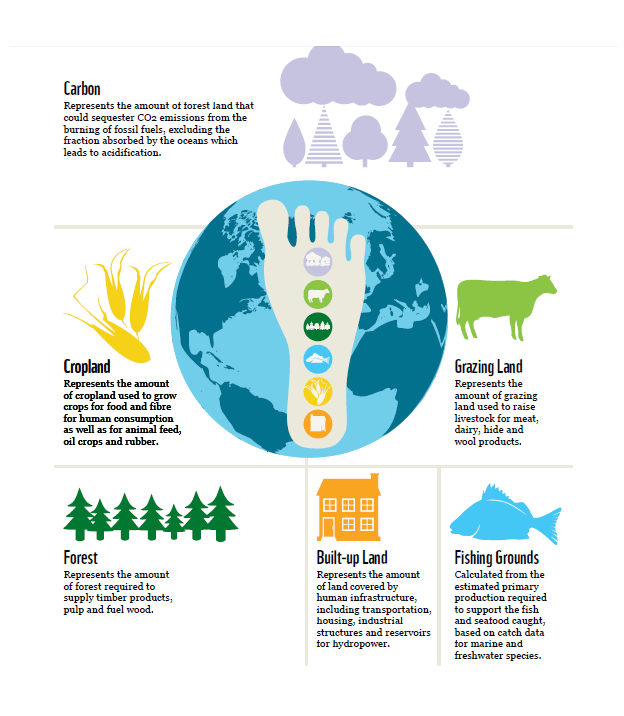Sustainability Individual Report
Sustainability and Ecological Footprint
Sustainability is one’s “ability” to “sustain”. Being sustainable means that the rate of resource consumption does not surpass the rate of nature’s regeneration/recovering, and the rate of waste production does not surpass the nature’s ability of decomposing; so that the Earth can remain as it is prolonged without being used up by human beings. Currently, this is not achieved.
The sustainability of an individual (or a given population) can be measured by one’s ecological footprint. An ecological footprint is the area of land and water needed to sustainably provided the resources needed to support one’s lifestyle. If the land and water needed is greater than what is actually available to the person, then the lifestyle is unsustainable. If everyone lived like me, we would need 4.2 Earths according to the footprint calculator.
This is what ecological footprint actually measures (more than half of my ecological footprint is carbon):
Plastic Consumption and Flights
I throw away lots of plastic trash and I fly on airplanes a lot. These two habits contribute most to my ecological footprint. I become aware of how much I use plastic: beverage bottles, plastic bags, and food packagings. Even if I take my own bag when going to shops, the things I buy are still wrapped in plastic. The problem is that plastic takes 450 to 1000 years to breakdown naturally, and they rarely get recycled. According to the National Environment Agency of Singapore, the recycling rate of plastic is the lowest among all the recyclable materials. Only 4% was recycled in 2018. Most of the plastic waste is incinerated, landfilled or thrown into the sea. Burning plastic releases carbon dioxide, toxic gas and might be using non-renewable fuel. Plastic underground or in water also leach toxic chemicals and harm the ecosystem and human health. Plastic pollution is also a very serious problem because many wild animals accidentally eat plastic and died from it. Plastic bags cause 100,000 sea turtle and marine animal deaths every year.
Flights contribute a lot to the carbon footprint. Airplanes emit carbon dioxide and various other air pollutants. A typical Boeing aircraft emits around 90 kg CO2 per hour per person. I travel about 50 hours per year. That’s 4.5 tonnes for just flying, and my total carbon footprint is 12 tonnes, which is just too much. A sustainable carbon footprint is 3 tonnes per person per year according to EcoCivilian.info. CO2 is bad because too much of it being released is the major cause of global warming. CO2 is a greenhouse gas. When the electromagnetic waves coming from the Sun hits the surface of the Earth, Earth absorbs some of it and warms up, but some of it bounces off. Greenhouse gases in the atmosphere absorb some heat and keep the Earth at the right temperature. However, if we have too much CO2, more heat will be absorbed Earth will be warmer than it should be. Global warming leads to ice mountain melting, sea level rise, irregular and extreme climate.
Changes I Should Make
To reduce my use of plastic, I should: Always take a reusable bag with me. Order less food delivery; don’t pack away food when eating out (try to finish the food). Once a week max for taking out food. As I wrote before, plastic is toxic, it damages ecosystems. Incineration of plastic also produces Carbon dioxide. And when buying snacks and drinks, I will look for the ones with paper packaging rather than plastic packing.
Normally I go to school by public bus, which is okay. Because the public transportation is considered to be sustainable and buses are there anyway…… But if I wake up a bit late, then I will take a taxi, so I should avoid that. And I was trying to cycle back home, but Singapore is always too hot or is raining. I can only sometimes cycle. I should avoid taking a taxi to other places as well, especially when I am getting there alone. This can reduce my carbon footprint. Cars are responsible for 50% – 90% of all air pollution in urban areas.
I can’t take less flights, but I could make my flight more sustainable. I could try to take direct flights every time. Because connecting flights fly over a longer distance, and the use of fuel is the most inefficient at take-off and landing. I was never aware of direct flight vs connecting flights in a sustainability perspective. And if I have multiple airline options, then I will search up their sustainability
If I can only make one change for the rest of my life, I will avoid non-reusable plastic. I think avoiding plastic waste has a greater and more direct impact. Unlike transportation, planes will fly without me, taxi still wonder around the city if I haven’t called it. Although in the long term, if everyone is aware of it, than it works. But reduce plastic is just more straight forward.
Works Cited
LeBlanc, Rick. “How Long Will It Take That Bag of Trash to Decompose in a Landfill?” The Balance Small Business, The Balance, 16 May 2019, www.thebalancesmb.com/how-long-does-it-take-garbage-to-decompose-2878033.
“Summary.” Aviation Sources, www.carbonindependent.org/sources_aviation.html.
“Three Tons Carbon Dioxide Per Person Per Year.” EcoCivilization.Info, www.ecocivilization.info/three-tons-carbon-dioxide-per-person-per-year.html.
“Waste Statistics and Overall Recycling.” National Environment Agency, www.nea.gov.sg/our-services/waste-management/waste-statistics-and-overall-recycling.
“The Atmosphere – OCR Gateway – Revision 5 – GCSE Chemistry (Single Science) – BBC Bitesize.” BBC News, BBC, www.bbc.com/bitesize/guides/zwdsjty/revision/5.

